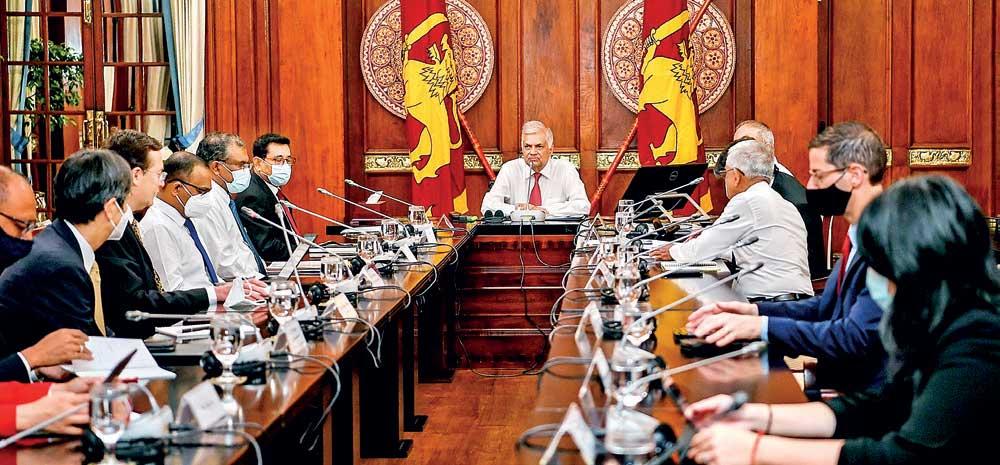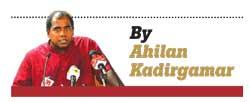Reply To:
Name - Reply Comment

Any future government must negotiate hard with the IMF
 The presidential election on September 21st is gaining momentum, and the candidates are debating the future of the IMF agreement. The NPP, one of the front runners in the election, has forthrightly said it will renegotiate the terms of the IMF agreement with an alternative debt sustainability analysis (DSA).
The presidential election on September 21st is gaining momentum, and the candidates are debating the future of the IMF agreement. The NPP, one of the front runners in the election, has forthrightly said it will renegotiate the terms of the IMF agreement with an alternative debt sustainability analysis (DSA).
However, there is a need for greater clarity on what it means to renegotiate the IMF agreement and the assumptions entailing an alternative DSA.
There are two central conditions in Sri Lanka’s 17th IMF agreement, which are different from previous agreements, given that Sri Lanka has defaulted and the IMF is now arbitrating debt restructuring. First, the IMF demands a high primary budget surplus—meaning government revenues minus expenditure excluding interest payments. Second, the IMF demands progress on debt restructuring with Sri Lanka’s creditors. Both these conditions are linked to the IMF’s DSA, which sets the targets for both the primary budget surplus and the level of debt relief that can be negotiated with the creditors.
Expedient deals
The reasons for renegotiating the IMF agreement are many fold. First, the IMF agreement was never really negotiated; the SLPP government led by President Wickremesighe went along with the IMF and the creditors and was only interested in expedient deals ahead of elections. Second, the IMF’s severe austerity measures have now created a new crisis of tremendous social suffering including disruption of livelihoods, rising poverty, food insecurity and the possibility of losing a generation. Third, the current economic policy trajectory is likely to culminate in another default and a prolonged crisis.
In this context, renegotiating the IMF agreement requires reconsidering the high primary budget surplus target and an overhaul of agreements with creditors to ensure much greater debt relief. Both should be based on an alternative DSA that not only ensures external debt sustainability, but more importantly, sustainable social and economic lives for our people.
The question before the country is not about updating or tweaking an outdated IMF Agreement and its DSA in the works from 2022. In fact, the IMF in June this year updated its DSA and tweaked the targets, as it routinely does, with the second review of its program. Rather, the task involves fundamentally revising the assumptions and goals of the IMF programme and it’s DSA.
Are such renegotiations with the IMF and the creditors possible? Yes, that is what Argentina did between 2018 and 2021. Does such renegotiation pose risks of the IMF walking away from Sri Lanka? Yes, it does, but that is the political will demanded of a new president capable of leading the country and ensuring the survival of the people.
There are many problems with the IMF’s DSA. First, it conflates external and domestic debt; while Sri Lanka defaulted on its external debt leading to foreign exchange constraints requiring debt relief, domestic debt can be extended as it is in rupees. Second, it assumes Sri Lanka can bear a primary budget surplus of 2.3% by 2025 without considering the social cost and possible political backlash against the government. Third, it assumes external debt servicing, consisting of principal and interest payments, of 4.5% of GDP is feasible from 2027 onwards. However, such debt servicing is equivalent to 30% of projected revenues or 30% of projected exports, and will further squeeze public services including education, health and social protection, and undermine future growth of the economy. Finally, it assumes floating International Sovereign Bonds (ISB) on the order of 1.8% of GDP every year from 2027, which amounts to a USD 1.5 billion ISB that year, and increasing each year in proportion with GDP growth.
Alternative DSA
An alternative DSA has to begin by refuting all these assumptions. External and domestic debt have to be considered separately, and allow room for deficit financing to both address the dire essential needs of the people through greater social welfare spending and state investment to spur economic growth. In particular, the primary budget targets should be at the levels of Sri Lanka’s peer countries or even less due to the crisis, which amounts to at least 3% lower than the current IMF target. Next, there is a need for much higher debt relief from creditors, so that high external debt servicing after 2027 will not lead to Sri Lanka defaulting again with another shock.
Given that Sri Lanka’s debt trap and default itself is linked to excessive high interest ISB borrowings, the DSA should not include such market borrowing in the future. In fact, the 4.5% of GDP external debt servicing target should first be reduced to 2.7% of GDP by deducting the proposed 1.8% of GDP in ISB financing. However, that alone will not solve the problem of debt sustainability, as the capacity to repay should be calculated on the basis of the import bill for essentials and productive investment, for example in machinery, that can be sustained given Sri Lanka’s foreign earnings.
Future priorities
Sri Lanka’s creditors can indeed bear much higher levels of debt relief as they have already made a killing over the last fifteen years by extracting high interest payments. Furthermore, the path forward for Sri Lanka’s sustainable development is dependent on not returning to such global financiers who are the cause of the debt distress of over seventy countries in the global South.
As I have argued in my past columns there is no IMF bailout, and the Sri Lankan economy over the last two years is running on its own foreign earnings; IMF disbursements equal USD 60 million a month, whereas Sri Lanka’s foreign earnings amount at USD 1,800 million a month. In fact, we have paid close to USD 2 billion dollars over the last two years in debt repayments to the International Financial Institutions including the IMF. Furthermore, for the current IMF programme of USD 3 billion disbursed over the four year period, Sri Lanka will be paying the IMF interest alone of USD 2 billion over the next ten years. Clearly, there is also a conflict of interest in the IMF playing the roles of arbiter and creditor.
All this to say, any new government must negotiate hard. The blackmail of the IMF walking away should be taken on revealing the IMF’s bias towards creditors and how Sri Lanka is now set up to default again and deteriorate. Any new government that comes to power must first outline how it plans to provide relief to a besieged citizenry and grow out of the current economic depression, and any assistance or agreements with external actors should be secondary to those domestic priorities.
In the year after the elections, the great injustice of domestic debt restructuring last year that has dispossessed close to half of the retirement funds of our working people should be redressed, with the government capitalising the retirement funds. Furthermore, addressing food insecurity, crippling cost of living, and disrupted livelihoods, should take centre stage. In the medium term, Sri Lanka needs to work towards a coalition of debtor countries to both negotiate better terms for debt restructuring and feasible development financing. In the meantime, the election debates and the election itself should provide a mandate to renegotiate the curse of this IMF agreement.